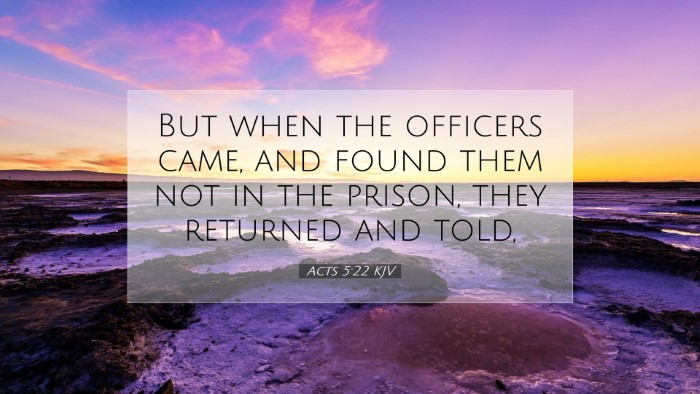Commentary on Acts 5:22
Acts 5:22 states: "But when the officers came, and found them not in the prison, they returned and told." This verse captures a pivotal moment in the early church’s narrative, highlighting both the workings of divine intervention and the challenges faced by the apostles. Below is a synthesis of insights from various public domain commentaries, aimed at providing a meaningful analysis for pastors, students, theologians, and Bible scholars.
Contextual Overview
The backdrop of Acts 5 is the rapid expansion of the early Christian church, which faced intense opposition from religious authorities. Following the miraculous escape of the apostles from prison, this verse serves as a crucial turning point in the account, emphasizing the boldness of the apostles and the impotency of human authority when set against divine will.
Divine Deliverance
Albert Barnes notes that this episode exemplifies the power of God in protecting His servants. The imprisonment of the apostles was intended to suppress the growing influence of Christianity. However, God's intervention is shown through their unexplained release. Barnes emphasizes the certainty that the apostles were fulfilling God's mandate, thereby securing His divine favor and protection.
Contrast of Authority
Matthew Henry highlights the contrast between the actions of the religious authorities and the divine agency at work. The officers’ confusion upon finding the prison empty underscores their human limitations. Despite their authority, they were powerless to prevent God's purpose from unfolding. This serves as a reminder of the ultimate sovereignty of God over human affairs.
Responses to the Miraculous
Adam Clarke points out the implications of this miraculous event for both believers and non-believers. The apostles’ escape was not merely a physical liberation; it also served to testify to God’s omnipotence. Clarke remarks that such events were foundational for the faith of early Christians, demonstrating that faith was not just a system of belief but was supported by observable divine acts.
The Role of the Apostles
At the heart of this narrative is the steadfastness of the apostles. They had been emphatic in their declaration of the Gospel, leading to their imprisonment. According to Barnes, their return to the temple to preach after being freed demonstrates their unwavering commitment to the mission entrusted to them by Christ. This act of boldness would inspire subsequent generations of believers to stand firm in their faith despite persecution.
Commissions and Consequences
Henry elucidates that the apostles’ unwavering obedience to their divine commission foreshadowed the challenges they would face. The empty prison not only signifies divine intervention but also sets the stage for further confrontations with authority, which would lead to significant theological developments within the early church. Pastors and theologians often cite this passage to highlight the call to steadfastness in the face of opposition.
The Reaction of the Authorities
The reaction of the temple officials, as they reported back that the apostles were no longer in custody, signifies a moment of confusion and frustration. Clarke notes that this bewilderment illustrates the futility of attempting to thwart God's plans. The officers had come expecting to impose discipline but instead confronted an undeniable testimony to the power of God.
Implications for Church Leadership
This narrative provides insights into the dynamics of church leadership in the face of persecution. Henry notes that leaders must recognize their ultimate accountability to God rather than human authorities. The narrative challenges leaders today to discern when to stand firm against worldly pressures while remaining committed to their God-given calling.
Theological Themes
The passage encapsulates several vital theological themes:
- Divine Sovereignty: The verse reinforces the belief that God’s plans cannot be thwarted by human authority.
- Faithfulness in Persecution: The determination of the apostles highlights an essential characteristic of true faith.
- The Power of Divine Intervention: God’s ability to free His servants reflects His active role in the affairs of believers.
Application for Today’s Believers
For contemporary believers, Acts 5:22 serves as a powerful reminder of God's faithfulness. In an era where the church faces various external pressures, the message of divine deliverance is particularly relevant. The commitment of the apostles encourages believers to be resolute in their faith and mission, reinforcing the belief that God's presence accompanies those who stand for truth.
Conclusion
Acts 5:22 encapsulates the tension between divine purpose and human authority. It reflects the core message of the early church, emphasizing God’s sovereign power over the attempts of any earthly institution to quell His mission. Believers today can draw encouragement from the steadfastness of the apostles and the assurance that divine intervention is always at hand in the face of adversity. This commentary underscores the lasting significance of this passage for understanding the nature of faith and the ongoing mission of the church in a complex world.


